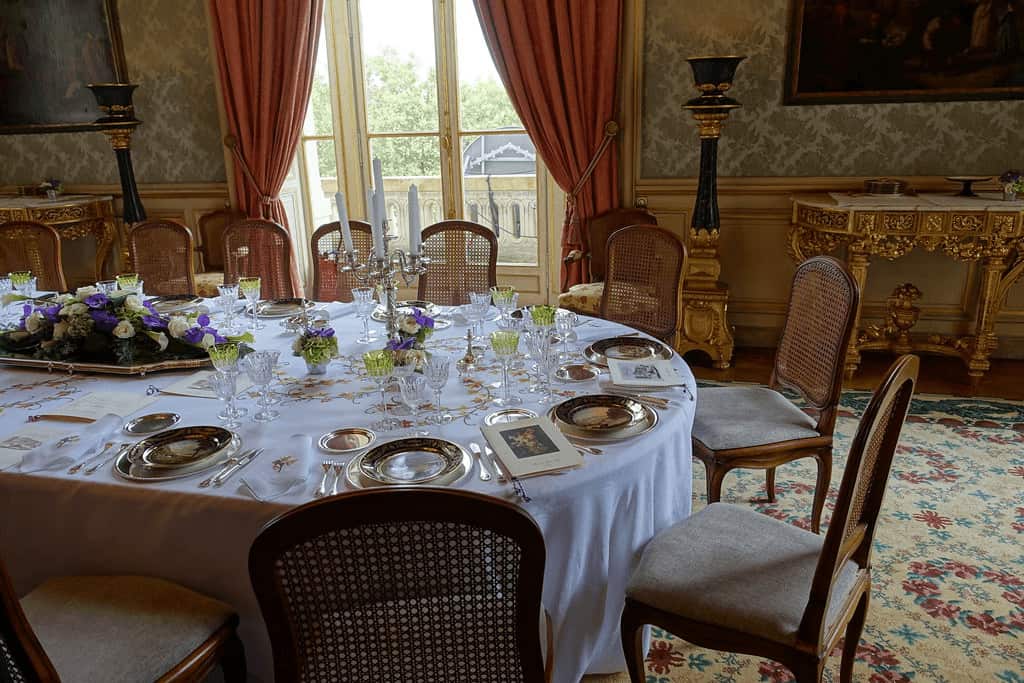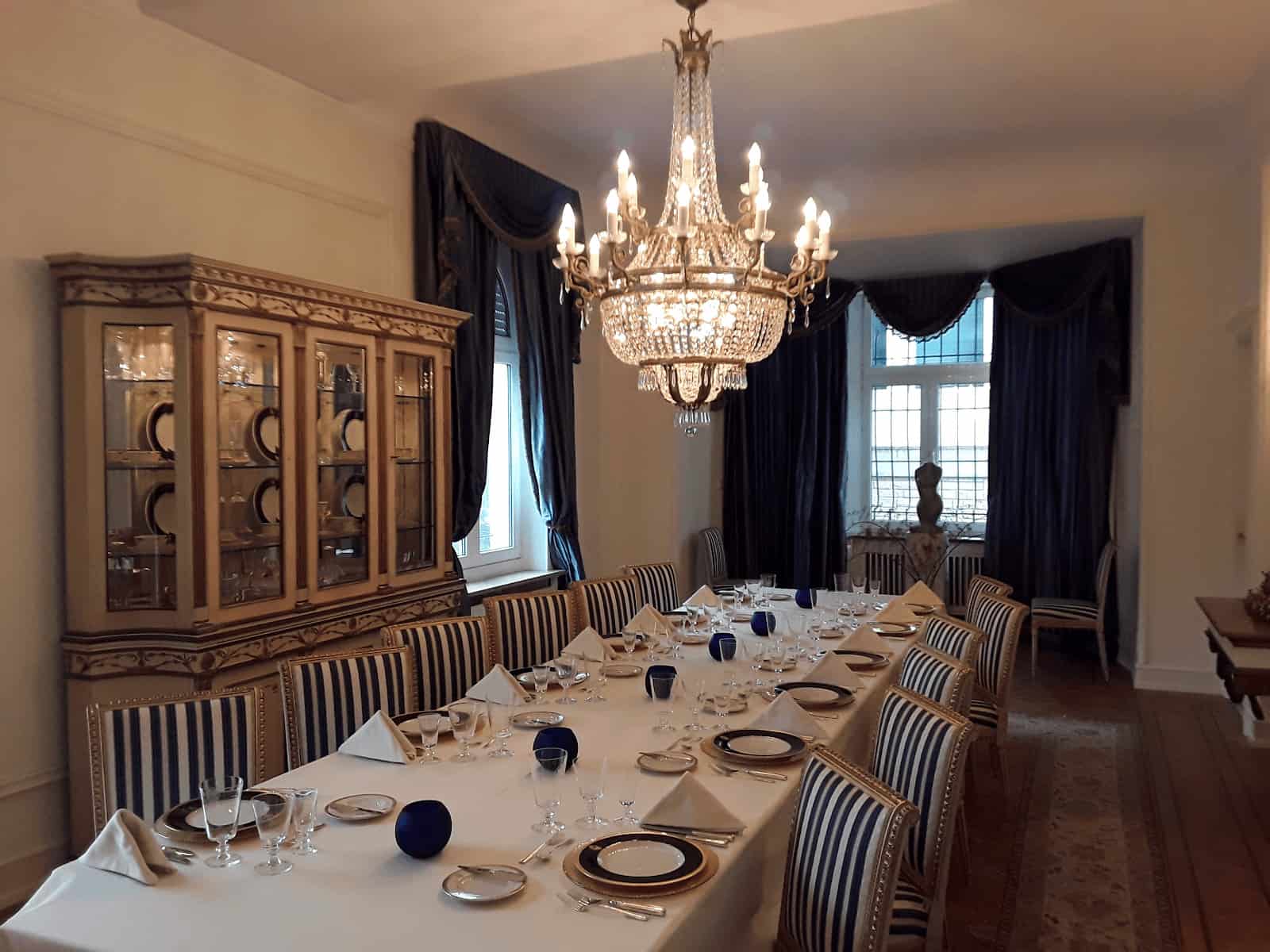Lord Palmerston, a former British prime minister and three time foreign minister, once famously noted, “Dining is the soul of diplomacy.” Countless diplomatic discussions have occurred over good food and drink, centered at well-dressed dining tables in embassies and diplomatic residences. Food brings people together, and the dining table makes for an excellent setting to develop cordial and productive relationships with others.
However, just as not all of our own dining experiences merit a generous tip, not all diplomatic dinners go as smoothly as planned. The following excerpts present a collection of amusing stories from U.S. Foreign Service Officers depicting the unexpected circumstances and mishaps that attended their own dinner parties.
Drafted by Ashley Young
ADST relies on the generous support of our members and readers like you. Please support our efforts to continue capturing, preserving, and sharing the experiences of America’s diplomats.
Excerpts:
George Griffin
Nairobi, Kenya—Deputy Chief of Mission (1987–1990)
George Griffin was interviewed by Charles Stuart Kennedy on April 30, 2002.
Read George Griffin’s full oral history HERE.
“At the end of dinner, the host rose and launched into a rather lengthy toast. About halfway through it, Smith went face down on his plate, asleep.”
Failed First Impressions: Smith’s [Smith Hempstone, U.S. Ambassador to Kenya] first diplomatic dinner was at British High Commissioner John Johnson’s house. He nabbed Hempstone first, using the “special friends” line, noting that he had been in Nairobi longer than most ambassadors, and offering to introduce him to some of Kenya’s most important people. So both Hempstones and my wife and I went to dinner, which featured former Attorney General Charles Njonjo and his wife, among others. The Brit and Hempstone took an instant dislike to each other, and barely got through dinner. I don’t think they said another ten words to each other for the rest of Johnson’s tour of duty. He had tried.
The next one was dinner at the residence of the Japanese Ambassador, who was Dean of the diplomatic corps. There were several other ambassadors at the huge granite or marble table, which was so large that the guest list could have been doubled, and we still could not have touched elbows. At the end of dinner, the host rose and launched into a rather lengthy toast. About halfway through it, Smith went face down on his plate, asleep. My wife tried to rouse him, to no avail. When the host finished, Kitty Hempstone stood up and returned the toast. Then she hauled her husband to his feet, and he staggered out the door and went home.
—–
Ambassador Edward Marks
Guinea Bissau—Ambassador (1977–1980)
Edward Marks was interviewed by Charles Stuart Kennedy on August 12, 1996.
Read Edward Mark’s full oral history HERE.
“The Foreign Minister of Guinea-Bissau read a classic and meaningless diplomatic speech… by the light of a flashlight while the mosquitoes buzzed and numerous wild cats roamed around and scrounged for food.”
A Series of Unfortunate Events: The new minister of foreign affairs decided he would have an annual diplomatic dinner. So, he arranged one at the hotel…. The dinner was going to be outside by the swimming pool, which hadn’t been cleaned in years. All the diplomatic chiefs of mission—all 14 of us—showed up. The Soviet came not only with his wife but with two aides who were not given seats. There was a big fuss about that. We all sat down around this table next to the swimming pool, in the dark African night with light coming from the windows of the hotel dining room. There were bugs all over the place. After we were settled, more or less, the Foreign Minister got up to speak but the lights went out, in the hotel and all over the city. But, he was prepared and had an aide with a flashlight who held it over his shoulder while his read his speech. We sat there in the dark next to an empty swimming pool on a hot African night while the Foreign Minister of Guinea-Bissau read a classic and meaningless diplomatic speech—long, in the Latin fashion—by the light of a flashlight while the mosquitoes buzzed and numerous wild cats roamed around and scrounged for food. The Chinese ambassador passed around a little tin of anti-bug ointment and all went pretty well, considering, except that the wife of the Brazilian Ambassador was bitten by one of the cats. That was the first government sponsored diplomatic dinner in Guinea-Bissau.
—–
Eddie Deerfield
Madras, India—USIS Information Officer (1966)
Eddie Deerfield’s memoir was published on June 1, 2012.
Read Eddie Deerfield’s full memoir HERE.
“In preparing the guest list, it hadn’t occurred to me that the U.S. didn’t have diplomatic relations with communist East Germany.”
Confusion—East Germany and India: My first posting was in 1966 as USIS Information Officer in Madras, India. We introduced ourselves to the Madras elite and diplomatic community by extending invitations to a reception in our new home. One of the invitations went to my counterpart at the consulate of the German Democratic Republic. In preparing the guest list, it hadn’t occurred to me that the U.S. didn’t have diplomatic relations with communist East Germany. The very puzzled GDR representative came to our reception and thanked me profusely. Rumors swirled about a possible change in American relations with the communist regime. Eventually, the incident was recognized as a friendly gesture by the new boy on the block, and U.S.-GDR relations returned to “business as usual.”
A few weeks later, my wife invited some Indian ladies to tea. She had also supervised the preparation of small cakes and a large bowl of fruit punch. Soon after the guests arrived, she told the server to bring in the cakes and the punch. He told the cook, “Madame said to bring the cakes in the punch.” When the bowl arrived on the dining room table, numerous small cakes were bobbing around in the fruit punch. Maybe the guests assumed that the soaked cakes were a new American delicacy.
—–
Hannah Greeley Kaiser
Dakar, Senegal—USIA English Teacher, Foreign Service Spouse (1961–1964)
Hannah Greeley Kaiser was interviewed by Jewell Fenzi on December 4, 1987.
Read Hannah Greeley Kaiser’s full oral history HERE.
“I explained to the cook [the meringues] should be filled with mixed fruits and cream, but I said fill them with glacé, not “crème de glacé.” Well, “glacé” and “creme de glacé” are two rather different things.”
Ice or Ice Cream?: I remember the first dinner party we gave. It had all been arranged for us by Pierre Graham, who was the political officer, I believe. He had decided on the forty most important citizens of Dakar for a dining room that was really basically set up for fourteen. So we had to have three tables in the dining room, because he had expected we could use outdoors, but the rainy season started just about that time and it was utterly out of the question to have it outdoors. So we had these three tables for forty people.
Here I was, brand new at the job, wondering what to serve and really kind of worried about whether the cook was understanding me. He was a tall, rather elegant man, who had been the cook under our predecessors. I should have had much more faith in him, but anyway, I decided to make meringues or “pinch pie,” as Irma Rombauer, the original Joy of Cooking editor calls them. I made three round, big meringues and put them in an air-conditioned room so they wouldn’t wilt before the party. I explained to the cook they should be filled with mixed fruits and cream, but I said fill them with “glacé,” not “crème de glacé.” Well, “glacé” and “creme de glacé” are two rather different things.
When they came in, they were put down on the sideboard. I looked over and saw that they were suspiciously flat. They were supposed to be very much like a small mountain. So the DCM’s wife and I got up and took those meringues back to the kitchen and in the speed of light threw out the ice cubes that were in them, while we saw the cook unmolding the ice cream.
It turned out the Portuguese laundress was helping that night and she knew what “glacé” was. It was ice. And I’m afraid the pecking order was such that this somewhat lighter Portuguese girl was allowed to make this mistake. The cook didn’t interfere when he, of course, knew exactly what I wanted. We were able to save the dessert and serve it and all was well. But I’ve dined out on the story not a few times.


